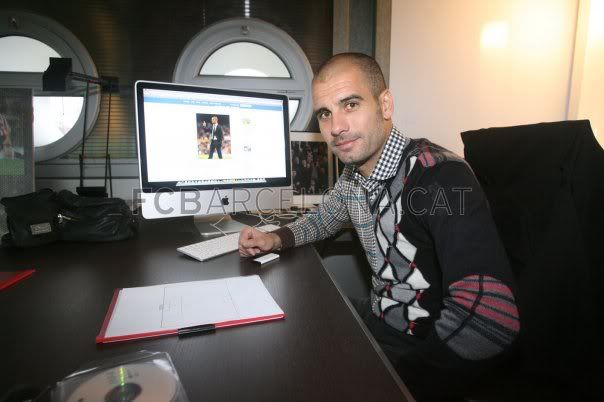An Article From Pep Guardiola at Age 29
'If something can change, it is ourselves. It's up to us'
Josep Guardiola has been at FC Barcelona since he was 13. The 29-year-old Catalan has captained the side for the past four years and has represented Spain some 40 times
Footballers have their brains in their feet, it's said. But you can't generalize. There are those who think about the rest of the world, and those who don't. I was born a footballer. I have played with a ball since I was a little kid in Santpedor, the village in Catalunya where I grew up.
My parents insisted that education came before football. I was a good student. After secondary school I did law for a year. I gave it up because I didn't have time to go to classes and play football, or the discipline to continue studying at home alone.
There is a special relationship between Catalans and this team we call Barça. Catalunya was repressed for many years, culturally and in the use of its own language. That makes you love these things more and want to defend them at the national and international level. For many years [under the rule of dictator Francisco Franco], the football stadium was one of the few places where people could safely shout "Visca Barça! Visca Catalunya!" (Long live Barca! Long live Catalunya!) It has been a point of reference for Catalans for 100 years.
Some people criticize the number of foreigners, particularly Dutch, who play for Barça, but I don't agree. It's the times we live in. Also, the Dutch football culture is the one I most admire. A country so small has produced so many great players and has opted for a very attractive style of attacking play. When [Dutch football legend] Johan Cruyff came here to manage Barça he changed our football culture, and Louis van Gaal continued that. In 10 years we won more titles than in almost the rest of our history. This is my 11th year, and I have six league championships, something only two other Barça players have equaled in 100 years.
It's true that Barça fans have a special feeling for Catalan players, just the way Manchester United people have for Keane or Beckham or Scholes. But they have also given great support to foreigners like Cruyff, Koeman, Romário, Stoichkov, Laudrup and Figo.
The money paid to footballers is crazy. But the market rules. I think if all clubs had the same salary limits it might even out the competition. It's the power of business. We come up against the clash between the passions felt for this club and economic power. Everything seems to come down to power.
Today, Europe is on the path to globalization, the opening of frontiers, the euro. But at the same time people want to keep their cultural roots and identity. Just as the English, for example, don't want to lose their Englishness. I think you defend a culture by talking, by understanding, by respecting differences, by being tolerant of other opinions. I don't like labels such as left, right, nationalist, even moderate nationalist. If you look at some of the nationalisms we have seen in Europe they are hardly examples to follow.
I am a pessimist. I share the view of a friend who said to me, "I arrived to try to change the world. Now, all I hope for is that the world will not change me." I think nowadays many politicians fight not for ideas but for power. If a politician knows that supporting a particular law will bring 20,000 votes, he'll do it, even if he doesn't believe in that law. It's a mistake because this leads to disillusion and abstention. Human beings seem too good, too well-made, too intelligent to have fallen as low as we have. Power changes people.
I know I have a certain power, through a media image. But I try never to use it. Really the main power I have is with a ball at my feet. When I leave football, that will disappear.
I never like the idea that you can impose things because of the position you hold. I don't know what I'll do after football, say in two or three years. The manager of the Spanish team says that you should never say, you will never do this or that after football. You might.
My wife and I are having our first child, a daughter, around Christmas, so evidently I do have some hope for the world. If something can change, it is ourselves. It's up to us. No Martians are going to come here to do it for us.
Pep wrote this ten years ago for Time Europe

Look at his amazing trainers. Mourinho, SAF, Capello would never wear them.


